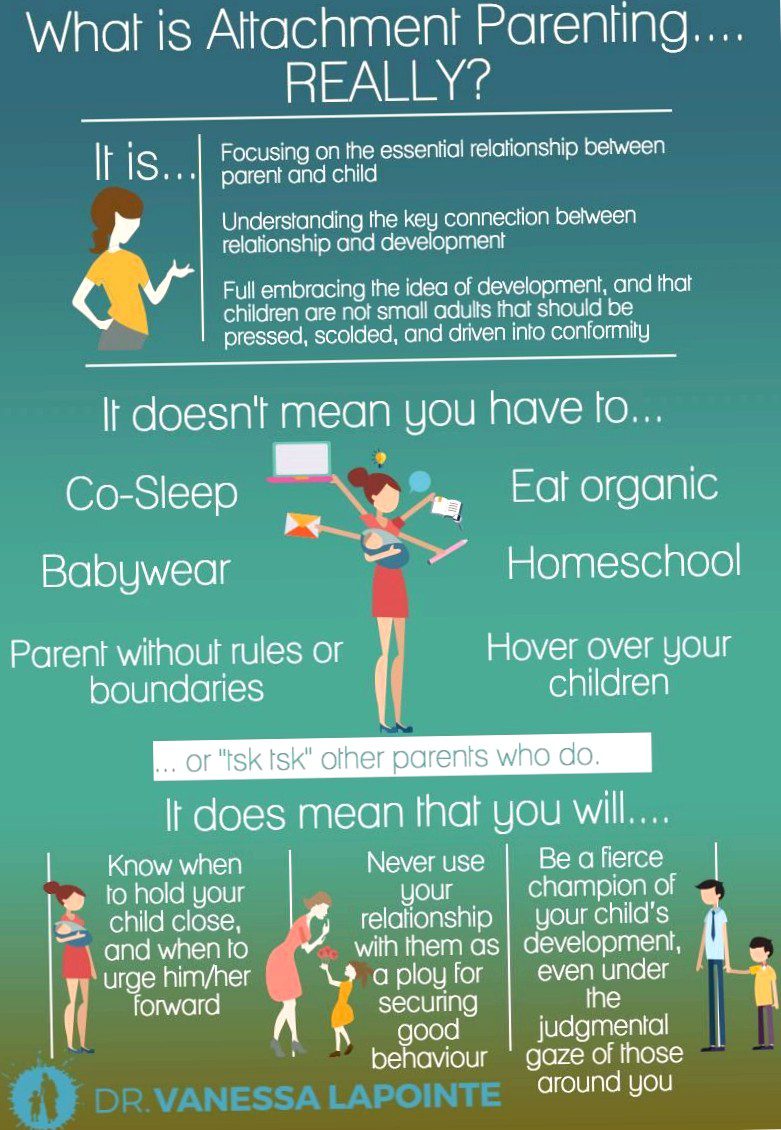
Attachment Parenting is a controversial approach that revolves around the bond between parent and child. It is about compassionate and needs-based education that aims to empower the child by providing emotional and physical support.
At first glance, Attachment Parenting seems simple, however, there are many opinions on what it really means and how it should be practiced. It is a complex topic that deals with many aspects of parenting.
In this article, we’ll take a closer look at this parenting approach, highlighting its origins, describing its basic principles, and discussing some of its main advantages and disadvantages.
The purpose of this review is to provide a better understanding of Attachment Parenting and to allow the reader to form their own opinion about it.
Attachment Parenting: what does it really mean?
Attachment parenting is a form of parenting that focuses on the needs of the child. The goal is to build a strong bond between parent and child and to create a safe and loving environment. Attachment parenting includes the use of intensive skin-to-skin contact, breastfeeding on demand, carrying the child in a sling or carrier, and sleeping in the parent’s bed.
However, it is not just about physical aspects. It is also about emotional connection, support and regulation. Attachment Parenting aims to allow children to express their needs and show them that they are receiving appropriate attention. It is a type of parenting built on trust, respect, and understanding.
Attachment Parenting brings numerous benefits, including improved emotional and social development and increased psychological resilience. However, it is important to note that Attachment Parenting is not for everyone. It can cause conflict and discomfort for some parents and children and requires a high level of commitment and sacrifice.
- Attachment parenting involves:
- Needs-based behavior
- Importance of attachment
- Breastfeeding on demand
- Carrying in a sling or baby carrier
- Sleeping in the parent’s bed
It is important for parents to be mindful of their own needs and boundaries to ensure that they are able to sustain this type of parenting. Attachment Parenting works best when it is viewed as a flexible concept that can be adapted to the needs and circumstances of the family.
Scientific evidence on attachment parenting
Attachment Parenting is a parenting method that focuses on a close bond between parents and children. The basics of Attachment Parenting are well documented in the scientific literature. Research shows that children who feel attached to their parents grow up to be healthier and happier adults.
It has been found that children who experience Attachment Parenting are able to form secure attachments with their parents. This close bond, based on love, understanding and togetherness, gives the child a sense of safety and security. It has been proven that children who bond securely with their parents are more likely to be able to cope with stressful situations in the future than children who have not formed strong attachments with their parents.
Attachment parenting also offers parents a way to build a positive relationship with their children. It promotes patient and sensitive parenting, as well as emotion management, which can help children feel more secure and safe. It can have a positive impact on the child’s emotional and mental health.
- No physical punishment
- Breastfeeding on demand
- Wearing the child in a baby carrier or sling
- Co-sleeping
- Uninterrupted care and attention
However, regardless of the parenting method parents choose, the most important thing is for parents to be loving and mindful with their children. A close relationship between parents and children can provide the foundation for a child’s happy and successful future.
Criticisms of Attachment Parenting
Attachment Parenting is a parenting method that sounds attractive to many parents. It’s about building a close bond between parents and children while responding to the child’s needs. However, despite its popularity, there are also criticisms of this method.
A common criticism of Attachment Parenting is that it can be very stressful for parents. Because this method often requires a high commitment of time, energy and attention. Parents who choose attachment parenting often have to give up many recreational activities, career goals, or social contacts in order to meet their children’s needs.

Another criticism is that attachment parenting does not work for all families. For example, parents who are single parents, have financial problems, or lack support from friends or family may have a difficult time adhering to the requirements of Attachment Parenting. In such situations, it can be difficult to care for the child while having enough time for work or other commitments.
- Another criticism of Attachment Parenting is:
- It is unclear whether Attachment Parenting actually has long-term benefits for children. Although some studies suggest that children who experience attachment parenting may do better in some areas than other children, there are also studies that show there is no difference. Therefore, it is important to carefully weigh the pros and cons before choosing this method.
Regardless of potential advantages and disadvantages, parents who choose Attachment Parenting should always keep in mind that the child’s health and well-being should come first. Attachment Parenting can have many benefits, but it is important that it is well thought out and fits the needs of the family.
Attachment Parenting and society
What is Attachment Parenting?
Attachment Parenting is a parenting method that focuses on close bonding between parent and child. Attachment Parenting principles include breastfeeding, carrying the child in a sling or carrier, and family bedding. The goal is to meet the child’s needs for closeness and security and to build a secure bond.
Why Attachment Parenting is being criticized?
Attachment Parenting is often criticized and ridiculed in society. Critics say Attachment Parenting is overdone and parents are spoiling the child too much. It is also often doubted that the child will be able to cope on its own later on if it is so tied to the parents. However, there are also numerous studies that show that Attachment Parenting has positive effects on child development.
How can Attachment Parenting influence society?
Attachment Parenting can impact society in several ways. On the one hand, it can help children grow up safe and secure and thus become self-confident and independent adults in the future. Second, Attachment Parenting can help bring about societal changes that are more responsive to the needs of children and parents. For example, businesses could offer flexible work hours and working conditions that would allow parents to have time for their children.